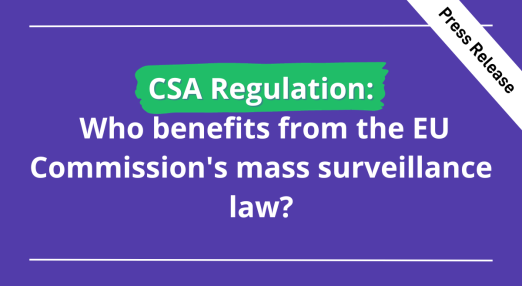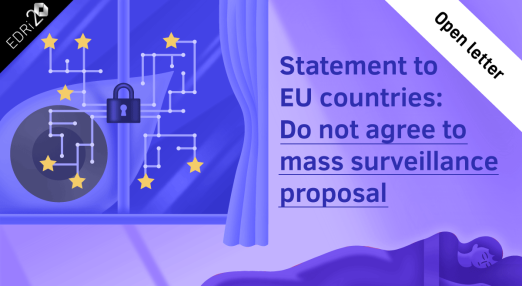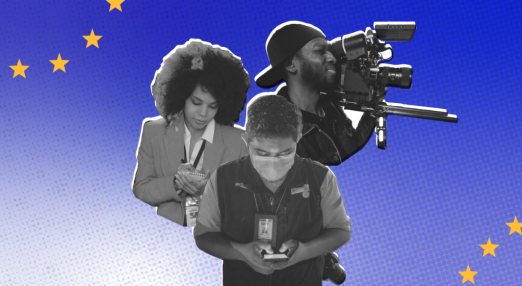Our work
EDRi is the biggest European network defending rights and freedoms online. We work to to challenge private and state actors who abuse their power to control or manipulate the public. We do so by advocating for robust and enforced laws, informing and mobilising people, promoting a healthy and accountable technology market, and building a movement of organisations and individuals committed to digital rights and freedoms in a connected world.
Filter resources
-

Press Release (CSA Regulation): Who benefits from the EU Commission’s mass surveillance law?
A newly-published independent investigation uncovered that the European Commission has been promoting industry interests in its proposed law to regulate the spread of child sexual abuse material online.
Read more
-

EU lawmakers must regulate the harmful use of tech by law enforcement in the AI Act
115 civil society organisations are calling on EU lawmakers to to regulate the use of AI technology for harmful and discriminatory surveillance by law enforcement, migration authorities and national security forces in the AI Act.
Read more
-

How to request access to your personal data stored by Europol: a guide
This guide is for everyone who wishes to access personal data on them that is processed, or has been processed, by Europol. Access requests help us to understand the extent of the agency's data collection and processing activities, and increase scrutiny.
Read more
-

The Stop Scanning Me movement organised a mass protest in Berlin against dangerous surveillance law
The German alliance against chat control "ChatkontrolleSTOPPEN!" mobilised people in a protest against the European Commission's mass surveillance plans under the Child Sexual Abuse Regulation (CSAR). The action took place during the visit of the European Union Interior Commissioner to the conference of the German Interior ministers in Berlin.
Read more
-

Halftime for the German government: Thank you for the fine words, now let the deeds speak!
The Free Software Foundation Europe (FSFE), together with an alliance of civil society and the Free Software industry, calls on the German government to implement a sustainable digital policy and to provide the necessary funds in the federal budget now.
Read more
-

Scroll more, sleep less. A Black Mirror-inspired truck in Warsaw advertises a disturbing social network… that doesn’t exist
Panoptykon’s campaign is being launched after the DSA has become fully effective with regard to VLOPs on 25 August. To comply with the new regulation, cybergiants must, among other things, introduce changes concerning their additive algorithms which they use to personalise users’ feeds. They must now explain how those algorithms work and offer at least one recommender system not based on tracking users’ personal data.
Read more
-

Council of Europe must not water down their human rights standards in convention on AI
In a joint statement, civil society calls for a broad scope and definition of AI systems and no blanket exemptions for AI systems for national defence/national security.
Read more
-

EDRi-gram, 13 September 2023
Are you ready to catch up on the recent digital rights developments in Europe after a nice summer break? The latest EDRi-gram has got you covered. From a fake social network that is spooking people in Warsaw to activists celebrating encryption, this edition brings you the hottest updates on everything digital. Stay informed and up to speed with the latest digital rights updates in Europe.
Read more
-

Open letter: EU countries should say no to the CSAR mass surveillance proposal
Today, EDRi and 81 organisations have sent an open letter to EU governments to once again urge them to say no to the CSA Regulation until it fully protects online rights, freedoms, and security.
Read more
-

Party-cipate and #CelebrateEncryption
Now is the time to show your support for encryption and influence the European Parliament to do better for children and everyone else. Join the #CelebrateEncryption action and share photos of you and your friends promoting privacy and celebrating encryption.
Read more
-

European Parliament’s CULT committee set to greenlight controversial amendment to the EMFA in today’s vote
The European Parliament’s CULT committee is set to vote on the EMFA. The committee is likely to approve the contentious 24-hour must-carry amendment that could make it harder to fight disinformation, and would undermine the Digital Services Act.
Read more
-

EU legislators must close dangerous loophole and protect human rights in the AI Act
Over 115 civil society organisations are calling on EU legislators to remove a major loophole in the high-risk classification process of the Artificial Intelligence (AI) Act and maintain a high level of protection for people’s rights in the legislation.
Read more
